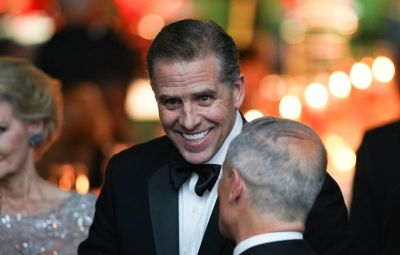As House Republicans’ investigations into financial transactions by President Joe Biden’s family members ramp up, GOP leaders are signaling impeachment proceedings may be on the horizon.
House Speaker Kevin McCarthy said on Sunday that Attorney General Merrick Garland could face an impeachment inquiry focused on Garland’s alleged weaponization of the Justice Department. The dispute revolves around witnesses who claim the Justice Department slow-walked an investigation into tax violations by Biden’s son, Hunter.
House Republicans have channeled much of their anti-Biden energy this year into the Oversight Committee, where Kentucky Rep. James Comer has led a probe into influence peddling by the president’s son and other members of the Biden family, as well as an allegation of bribery that dates back to when Joe Biden was vice president.
But shortly after Hunter reached a deal with federal prosecutors to plead guilty to two misdemeanor tax offenses last week, the Ways and Means Committee—which has jurisdiction over the IRS—released interview transcripts of two witnesses who had previously testified about possible political interference in the Justice Department’s investigation. The transcripts run for hundreds of pages and provide Republicans with new ammunition to make their case.
The two witnesses—one named Gary Shapley and another whose name was redacted—were both criminal investigators for the Internal Revenue Service and worked under Delaware U.S. Attorney David Weiss as he investigated tax violations by Hunter Biden. Both witnesses testified that the Department of Justice “slow-walked” the case and didn’t give Weiss full authority to follow the facts. Weiss sought to bring charges against Hunter Biden in Washington, D.C, and California but was denied, and he requested special counsel status from the Justice Department and was denied that too.
“It will get us into hot water if we interview the president’s grandchildren,” Assistant U.S. Attorney Lesley Wolf told investigators at one point, according to the second whistleblower. The witness also said that unexpected hurdles to a proposed search of a storage unit, communicated to him by Wolf, suggested to him that “David Weiss wasn’t really in charge.”
The witnesses’ accounts conflict with that of the Justice Department, including multiple statements by Garland as well as a recent letter from Weiss himself to Rep. Jim Jordan, the chairman of the House Judiciary Committee.
“I want to make clear that, as the Attorney General has stated, I have been granted ultimate authority over this matter, including responsibility for deciding where, when, and whether to file charges,” Weiss—a Trump appointee whom Biden kept in place to avoid the appearance of interference in the ongoing investigation against his son—wrote in the June 7 letter. He added his decisions have been made “without reference to political considerations.”
It didn’t take long for the disparities between these versions of events to draw the attention of lawmakers. McCarthy tweeted on Sunday that “if the whistleblowers’ allegations are true, this will be a significant part of a larger impeachment inquiry into Merrick Garland’s weaponization of DOJ.” He also said that “Weiss must provide answers to the House Judiciary Committee.”
The new testimony also gives McCarthy an opportunity to build political capital with the Freedom Caucus and other hardliners in his conference. Jordan, the Judiciary Committee chair, is a longtime member of the House Freedom Caucus and also chairs the Select Subcommittee on the Weaponization of the Federal Government.
McCarthy has found himself increasingly at odds with the Freedom Caucus since striking a debt ceiling deal with President Biden last month. And later this year, he’ll likely have to disappoint them again in order to reach an agreement on government funding with the Democratic-controlled Senate. Discontent on the fringes is translating to some chaos on the House floor, especially with respect to measures targeting Biden and his cabinet officials. Last week, McCarthy and other House GOP leaders had to wrangle the conference to avoid voting directly on a privileged resolution brought by Freedom Caucus member Rep. Lauren Boebert to impeach Biden over his border policy (Republicans voted to send it to committees instead.)
Unlike Boebert’s resolution, the story of alleged political interference in Hunter Biden’s criminal case has grounding in sworn testimony from witnesses. That could provide more substantive fodder for committee action and build toward impeachment of Garland or other federal officials, even if a “smoking gun” implicating the president himself in criminal wrongdoing has not yet emerged.
“There are a lot of threads to pull from those transcripts” for Ways and Means, Judiciary, and Oversight, a Republican Oversight Committee staffer tells The Dispatch. “It is a trove of information.”
On the Floor
Both chambers are out of session this week.






Please note that we at The Dispatch hold ourselves, our work, and our commenters to a higher standard than other places on the internet. We welcome comments that foster genuine debate or discussion—including comments critical of us or our work—but responses that include ad hominem attacks on fellow Dispatch members or are intended to stoke fear and anger may be moderated.
With your membership, you only have the ability to comment on The Morning Dispatch articles. Consider upgrading to join the conversation everywhere.